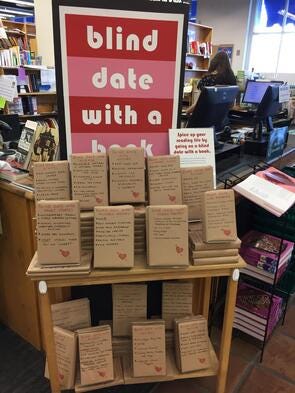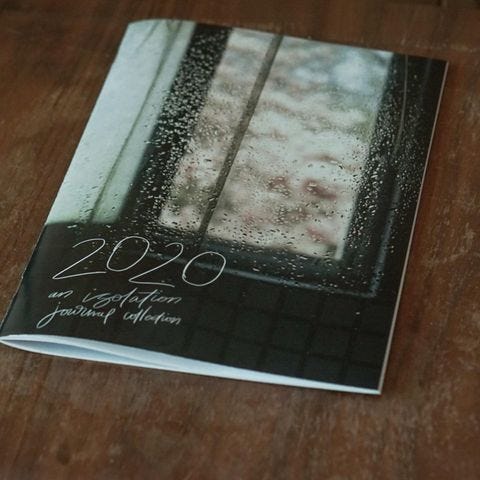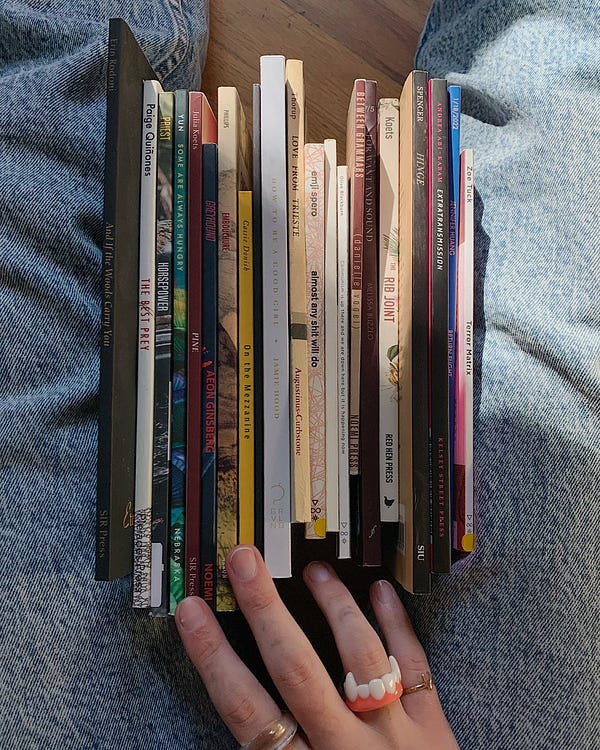Hi & happy Monday.
A quick note:
Today’s letter is long. If you’re an email subscriber, you’ll want to click on the title to open it in a new window because the message will be clipped.
Here’s what I have for you today:
Housekeeping
Gift guide
On tracking your influences (& reflections)
What I read over the weekend
Quotations
Tweets
Housekeeping:
A few things!
Okay, so I turned on the option to become a ~paid subscriber~ because a few people kept asking about that. If you keep your free subscription, you’ll keep getting emails from me 2x a week for the foreseeable future and—if you choose to pay the $5 per month—I’ll come up with useful posts & resources & discourse available only to you.
In summary:
For everyone as broke as me: no changes to your newsletter experience.
For people who can spare $5/month: I will give you extra goodies.
What else?
I had a collage come out last week. Here it is:
Gift guide:
If anyone’s still looking for gifts for someone they love this Christmas,
might I recommend a book subscription? I will send your honey a book every month for $10—you can cancel anytime, so it would be $120 for the whole year or $40 for four-months-worth. FUN.
There’s also this: 44 Writers on Their Favorite Books to Give as Presents.
And here are some things from small businesses that I wish were in my stocking because I love them:
On tracking your influences:
As someone interested in archival work—and someone who writes down everything, because I’m terribly forgetful—I believe in tracking your influences. That is: keeping track of what you’re reading & thinking about to identify the ways in which these other sources are in conversation with your own work.
It’s something I do even here, in this newsletter. Twice a week, I jot down a list of texts I read & quotations I underlined, among other things. It’s served as a means of journaling.
I’ve done it for years on Goodreads, too: tracking the books I read & categorizing them in a way that makes sense to me. Others use tumblr, or Instagram, or a blog, or a physical notebook.
In part, this practice interacts with the idea of showing your work, but it also was hugely beneficial to me while working on the critical component of my master’s thesis—which required me to sort of map my influences, my poetics, etc.
Because of all this trying-to-keep-track-ness,
it’s easy for me to identify my favorite reads of 2021. This year, I gave the following books 5-stars on Goodreads—a rating that’s hard to come by, with me:
300 Arguments, Sarah Manguso
Feeling Upon Arrival, Saretta Morgan
Horsepower, Joy Priest
If Not, Winter, Sappho (tr. Anne Carson)
How to Be a Good Girl, Jamie Hood
Young Tambling, Kate Greenstreet
Time Is the Thing a Body Moves Through, T Fleischmann
& here’s a longer list of books I read & loved this year:
Additionally,
the month of December tends to coincide with us reflecting on our year at large. Often, people will think about (and share) their successes, but…it’s not really in my nature to be self-congratulative, though I enjoy reading other people’s positive reflections.
I have a different kind of list for you, though. Here it is.
All the journals that rejected me in 2021 (& I still love you!):
Still: The Journal
Green Briar Review
Brink
Invisible City
Split Lip Magazine
Glassworks Magazine
Kitchen Table Quarterly
Barrelhouse
The Abbey Review
580 Split
Ninth Letter
Welter
The Fiddlehead
Poetry Northwest
Mud Season Review
The Sun Magazine
Grain Magazine
Guernica
Cutleaf Journal
Puerto del Sol
Baltimore review
The Spectacle
Colorado Review
The Los Angeles Review
The Puritan
Consequence
Foglifter
The Poetry Review
The Kenyon Review
New England Review
Passages North
The Journal of Compressed Creative Arts
Nashville Review
filling Station
Prospectus
Bat City Review
carte blanche
Lunch Ticket
Salt Hill
Blue Earth Review
Black Warrior Review
Driftwood Press
Room
Burrow Press Review
The Maine Review
Denver Quarterly
The Rumpus
The Offing
American Chordata
Rhino Poetry
Canned
The Journal
Fairy Tale Review
Empty Mirror
Bayou Magazine
So to Speak
Chestnut Review
Poetry Magazine
Spider Road Press
Newfound
Passengers Journal
Permafrost Magazine
descant
OxMag
Broad River Review
Variant Literature
Mikrokosmos Journal
Canthius
Hayden’s Ferry Review
Santa Ana River Review
Sycamore Review
Redivider
Boston Review
The Rialto
Rappahannock Review
Blackbird
The Greensboro Review
Storm Cellar
TriQuarterly
Sugar House Review
Naugatuck River Review
Capsule Stories
Hypertext Magazine
Arkana
The Healing Muse
Willow Springs
Boulevard
Carousel
The Idaho Review
Michigan Quarterly Review
New South
32 Poems
Rattle
Granta Magazine
BOOTH
the minnesota review
Plentitude Magazine
Belmont Story Review
Electric Literature
Washington Square Review
Beloit Poetry Journal
The Emerson Review
Flash Fiction Online
The Southampton Review
Alien Magazine
Shenandoah
I’m thinking, too, about Kim Liao’s article Why You Should Aim for 100 Rejections a Year. I also believe in submitting often & widely. And—although my year was full of failures—one thing I did succeed at is amassing over 100 rejections. I just looked and, on Submittable alone, I received 283 this year. Yee-haw.
In conclusion!
Publishing is subjective and weird. I just delete the “declined” emails & try, try again.
What I read over the weekend:
On “stand & model,” Davey Davis
David Bowie: On queer muses, Davey Davis
On Pleasure, Davey Davis
On fantasy and girl power, Davey Davis
On gay movies and straight movies, Davey Davis
My Ecstatic Body: T Fleischmann Interviewed by Mattilda Bernstein Sycamore
On why, Davey Davis
On genital preference, Davey Davis
On genital preference (2), Davey Davis
On genital preference (3), Davey Davis
What I’m reading today:
The End, Aditi Machado
Quotations:
I needed to find artists who were escaping their backgrounds, like I felt I’ve always been escaping mine—those who have had to work shit jobs, who have hustled too, who are unashamed. Who created art against—not art for. Whose lives sometimes were their art.
-Kate Zambreno
What I want to write are portraits of my obsessions.
-Kate Zambreno
For me, it was never about getting off, but about the electricity of the strange collision. I don’t think we were even attracted to each other. It was just something to do. The temporary clanging together of two fucked up people.
-Kate Zambreno
There is always something to be angry about, always something to rage against.
-Kate Zambreno
I told myself that I was going to write about rage today, but instead, I’m writing about elegy. Can one write both with rage and elegy?
-Kate Zambreno
Sonnets tend toward completion […] and synthesize toward a statement of some kind—the resolution of an argument.
-Aditi Machado
The poem staggers on the cusp of knowing.
-Aditi Machado
Form is not a fixture but an activity.
-Lyn Hejinian
Studies show that cishet men struggle with high rates of loneliness because they’ve been socialized to believe that their only intimacy can be with the straight cis woman they monogamously partner with. We’ve all seen the memes and TikToks joking about straight men who secretly enjoy being the little spoon—the joke being that men are ashamed of or unable to be sexually or intimately provided for by a woman. Because that would make her the top, you see. Which would make him the bottom. Which would make him gay. Or a woman. Or something.
-Davey Davis
I’m accustomed to self-pathologization, but lately I’ve begun to identify the compulsion to write and the will to survive as a single mechanism, one that’s at times maladaptive but which derives, nevertheless, from an essential vitality. What is wrong with a child who wants to be of consequence, to be seen and heard and regarded? Nothing, I think. Writing is just one of the ways we attain that goal. No one is lost who is still writing.
-Davey Davis
With exceptions like the luminous Moonlight, I tend to avoid Oscar-bait and critically acclaimed flicks about gay people, and flat-out ignore them if they’re about trans people. The payoff aint worth the risk of having my feelings hurt, and I despise seeing straights make money for playing queer at no professional cost.
-Davey Davis
I remember when I first realized how easy it was to have sex with men in public. Men are such sluts! I was kind of delirious with the realization that, at least in large cities, I could have sex with men more or less anytime I wanted, and all different kinds of men, too. There’s something ecstatic about it, and there is also the undercurrent of violence or the potential of violence—from the men, from the police, from strangers. I point in one section toward Samuel Delany’s Times Square Red, Times Square Blue, which does a much better job explaining the revolutionary potential in these kinds of encounters than I could, but I’m interested in anonymous, public sex in part because it feels like an act of collective defiance, a tradition of people claiming space back from the state and corporations, for pleasure.
-T Fleischmann
I've always been interested in fantasy as a middle ground between desire and reality and hence a terrain for the unfolding of ethical and metaphysical questions. Fantasies help us negotiate consciously what we do or don't want, what we would or wouldn't do, what we are or aren't turned on by.
-FuckTheory
The history of poetry is pockmarked by innovation and invention, by the struggle for the new not as novelty but as necessity.
-Charles Bernstein
Fundamentally, construction is at the heart of writing.
-Charles Bernstein
To imagine that there is a neutral space, a craft of poetry, that is free of ideological domination or contamination, is positivism.
-Charles Bernstein
Poetry is always a kind of translation, transformation, transposition, and metamorphosis.
-Charles Bernstein
I don’t think one must necessarily relate so-called deviant desire to trauma. Nor do I think that there’s anything wrong with being influenced by one’s experiences, which, for the vast majority of us, are shaped by pain as much by anything else.
-Davey Davis
&
some of you may remember me reading Leslie Feinberg’s Stone Butch Blues a few months back, a book that broke & mended me simultaneously. Here are Davey Davis’s thoughts on the book—which are far more articulate than mine could ever be:
[Stone Butch] Blues is not perfect, but it was so far beyond anything I had been exposed to, including anything I read in the one or two gender studies classes I’d taken in college, it was nothing less than a paradigm shift for me, because for the first time, I could see a historical precedent for people like me and my friends, a document of what existed prior to, and somehow survived, police repression, heterosexual violence, the AIDS epidemic, and centuries of poverty and disenfranchisement.
There is such an intense loneliness to thinking that one is the first, but I promise you that none of us ever were.
Tweets:







That’s all I have for you today. Thanks for being here.
-Despy Boutris














